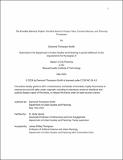The Klondike Memory Project: Klondike Memory Project: Race, Counter-Memory, and Planning Processes
Author(s)
Thompson-Smith, Diamond
DownloadThesis PDF (17.26Mb)
Advisor
Harriel, Holly
Terms of use
Metadata
Show full item recordAbstract
This thesis expands on existing community-driven archiving work started by the Klondike-Smokey City Community Development Corporation (KSCCDC) in 2016 to share untold and lesser-known collective histories from Klondike and Smokey City neighborhoods in Memphis, Tennessee. Using a photo essay and forth-coming cartographic tools as dissemination methods, I aim to support communal healing and reconciliation following long histories of structural racialized disinvestment in these neighborhoods. In this project, we amplify challenges to state narratives that attempt to decontextualize Black history from racist regimes and legacies to subjugate Black and Brown epistemologies. In this thesis, I propose that memory work and acts of truth-telling offer communities that have experienced racial planning and state erasure a pathway toward acquiring justice and repairing structural harm by helping them reaffirm their identities, assert their humanity, hold perpetrators of harm accountable, and envision liberatory futures. I also claim that memory is a tool planners can employ within the reparative framework to help disrupt “rational” planning logic that attempts to discredit embodied experience and epistemologies of Black people as invalid data or “non-data.” Lastly, I insist that using critical cartographic practices such as counter-mapping further disrupts White supremacy and erasure practices embedded within rational planning logic and archival practices by situating the validity of collective memory in place and landscapes.
Date issued
2024-05Department
Massachusetts Institute of Technology. Department of Urban Studies and PlanningPublisher
Massachusetts Institute of Technology